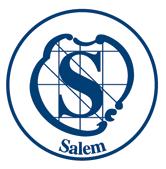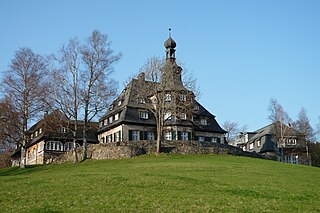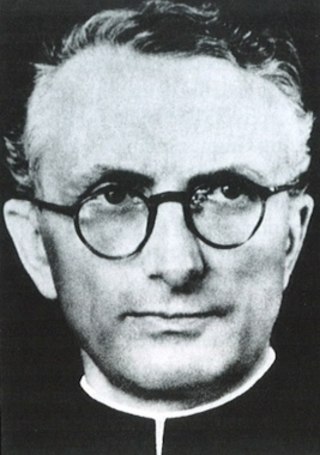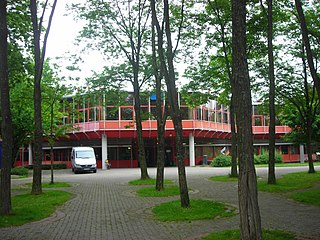
Alfred Delp was a German Jesuit priest and philosopher of the German Resistance. A member of the inner Kreisau Circle resistance group, he is considered a significant figure in Catholic resistance to Nazism. Falsely implicated in the failed 1944 July Plot to overthrow Adolf Hitler, Delp was arrested and sentenced to death. He was executed in 1945.

Schule Schloss Salem is a boarding school with campuses in Salem and Überlingen in Baden-Württemberg, Southern Germany.

Birklehof School is a progressive educational boarding school and grammar school with a holistic approach located in Hinterzarten in the High Black Forest in Germany, approximately 25 km from Freiburg. It is a private coeducational secondary school. Currently, the school has approximately 230 students, 170 of whom are boarders who live on campus. The school was established by educator Kurt Hahn in 1932 and from the beginning accepted girls and boys. Under the Nazi regime, Hahn was forced to emigrate to Scotland where he founded Gordonstoun School as well as later Outward Bound, Round Square and the United World Colleges.
Saint Blaise was a physician and bishop of Sebaste, martyred in 316.

The Aloisiuskolleg is a co-educational, Jesuit (Catholic), University-preparatory school in Bonn-Bad Godesberg, Germany, which includes boarders. It is named for Saint Aloysius Gonzaga. Highly ranked academically, it is considered one of the most prestigious boarding schools in Germany. Since early 2010 the school has been investigated for cases of child abuse.

Saint Blaise Abbey was a Benedictine monastery in the village of St. Blasien in the Black Forest in Baden-Württemberg, Germany.

St. Blasien is a small town located in the Waldshut district in Baden-Württemberg, Germany. It is situated in the Southern Black Forest, 17 km northeast of Waldshut-Tiengen.

Sankt Georgen Graduate School of Philosophy and Theology is a higher education Jesuit college in Frankfurt am Main, Germany.

The Canisius-Kolleg Berlin (CK) is a private, Catholic and coeducational Gymnasium directed by the Society of Jesus in Berlin, Germany. The school is named after Saint Peter Canisius. It is known as one of Berlin's most prestigious schools.

Sächsisches Landesgymnasium Sankt Afra zu Meißen is a boarding school for highly gifted students in the German city of Meissen, Saxony. Founded in 1543 as Fürstliche Landesschule and re-established in 2001, the stated aim of the school is to promote the intellectual and social development of highly gifted students. The costs for attending the school comply with the maxim of social balance; the boarding and schooling fees are considerably low in contrast to similar institutions. It is the first publicly funded school for highly gifted students in Germany and is a role model for similar schools.

Rev.Otto Faller SJ was Provincial Superior of the Jesuit order in Germany, educator, teacher and Dean at Stella Matutina in Feldkirch, Austria and Kolleg St. Blasien in Germany, professor of patristic studies at the Gregorian University. He was lifelong editor of the works of St. Ambrose. At the request of Pope Pius XII, he contributed to the preparation of the dogma of the assumption of Mary and organized new Papal charity and Papal refugee offices during World War II.

Stella Matutina in Feldkirch, Austria, was a Jesuit school that operated in 1651–1773, 1856–1938, and 1946–1979.

Alois Grimm was a Jesuit priest, Patristic scholar, educator, and victim of Nazi religious hostility.

The Rabanus-Maurus-Gymnasium is a classical gymnasium school in the Neustadt district of Mainz.

Ferdinand von Schirach is a German lawyer and writer. He published his first short stories at the age of forty-five. Shortly thereafter he became one of Germany's most successful authors. His books, which have been translated into more than 35 languages, have sold millions of copies worldwide and have made him "an internationally celebrated star of German literature."

The DFG / LFA Freiburg is a DFG/LFA, a public French-German secondary school in Freiburg im Breisgau, Germany. It offers free education from grades 5 through 12.

The Sankt-Ansgar-Schule is a private secondary school in Hamburg, Germany. It was founded in 1946 as the only boys' school by the Society of Jesus, an order of the Catholic Church, in the State of Hamburg. The school was named after Saint Ansgar who christianized Northern Germany in the 9th century. The motto of the SAS is: bonitatem et disciplinam et scientiam doce me, domine which is engraved above the official main entrance. In 1978, it became a co-educational school. The Jesuits gave up running the school in 1993 themselves but the Sankt-Ansgar-Schule has remained a member of the association of Jesuit schools and still follows all of the order's rules for their educational institutions. Currently, the archbishopric of Hamburg formerly runs the school.
Wolfgang Martin Stroh is a German musicologist and Emeritus professor at the Carl von Ossietzky Universität Oldenburg.
The Musisches Gymnasium Frankfurt was an educational institution leading to a university entrance qualification within the framework of the National Socialist Education System. It was founded in 1939 as the first Musisches Gymnasium of the then Greater German Reich at Adolf Hitler's request and closed after the end of the Second World War in 1945. The school was under the direct supervision of the Reich Ministry of Science, Education and Culture, and the city of Frankfurt was the school authority. It became known under its director Kurt Thomas. In its internal constitution, the Musisches Gymnasium retained a special position within the National Socialist elite schools, for example through the performance of otherwise suppressed church musical works or the inclusion of confessional religious instruction in the timetable.


















